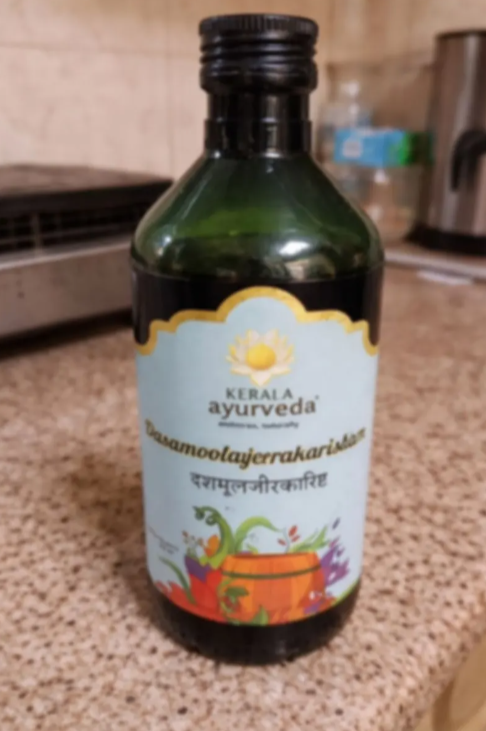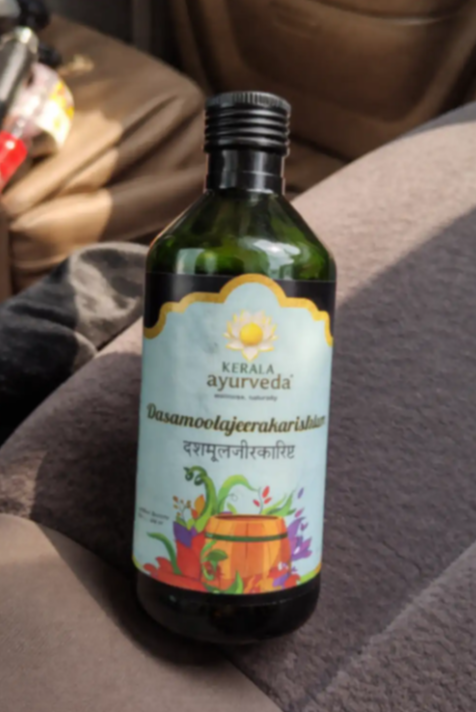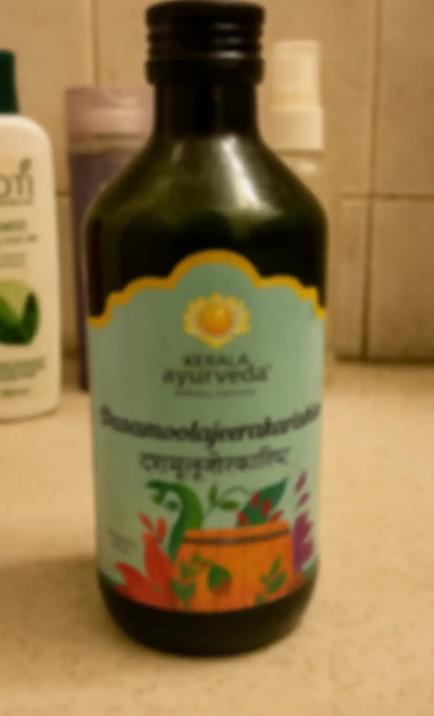Key Benefits of Kerala Ayurveda Dasamoolajeerakarishta
- Supports postnatal uterine health and helps tone the uterus.
- Promotes healthy digestion and soothes occasional discomfort.
- Helps maintain balanced hormone levels after childbirth.
- Strengthens overall vitality and replenishes energy.
- Traditionally used to reduce postpartum inflammation.
- Offers gentle support for digestive toxins (Ama) elimination.
- Encourages natural mother’s recovery with time-honored herbs
Product Description of Kerala Ayurveda Dasamoolajeerakarishta
Kerala Ayurveda Dasamoolajeerakarishta is a time-tested tonic, crafted by fermenting ten powerful roots (Dasamoola) along with supporting herbs. It’s especially beloved in the postpartum period, when a new mother’s body needs gentle, nurturing care. The blend works holistically—soothing digestion, toning the uterus, and easing occasional discomfort. Many mothers say it felt like a warm hug for their insides.
Unlike harsh modern tonics, this arishta engages your body’s own wisdom—fermented goodness, mild taste, a hint of sweetness, and a touch of tang. It’s traditionally served warm with water or milk, but some folks prefer it straight up, especially if they’re in a hurry. And yes, it’s slightly tangy, but that’s part of its charm!
Historically, practitioners recommended it not only for mothers, but also for anyone seeking a gentle digestive and uterine tonic. In Kerala’s herbariums, you’ll find records of sage women prescribing it after childbirth. So while we can’t promise miracles, we can say this: women have trusted it for generations, and it still gets passed down mother to daughter.
Key ingredients with descriptions of Kerala Ayurveda Dasamoolajeerakarishta
- Bilva (Aegle marmelos): Balances all three Doshas and supports healthy digestion.
- Syonaka (Oroxylum indicum): Traditionally used for anti-inflammatory support.
- Gambhari (Gmelina arborea): Tonifies and helps alleviate postnatal weakness.
- Patala (Stereospermum suaveolens): Known as a mild cardiac and diuretic tonic.
- Agnimantha (Premna integrifolia): Used for its Vata-pacifying properties.
- Salaparni (Desmodium gangeticum): Supports immune resilience and gut health.
- Prishniparni (Uraria picta): Traditionally used for respiratory and anti-inflammatory support.
- Brahati (Solanum indicum): Employed in Ayurveda for gentle anti-inflammatory action.
- Kantakari (Solanum surattense): Known for its antioxidant and mild diuretic effects.
- Goksura (Tribulus terrestris): Used to balance Vata and Pitta Doshas.
Key uses of Kerala Ayurveda Dasamoolajeerakarishta
- Postpartum uterine support: Helps the uterus return to its normal state.
- Digestive wellbeing: Alleviates occasional bloating and indigestion.
- Hormonal balance: Encourages steady hormone levels after delivery.
- General weakness: Rejuvenates and revitalizes fatigued mothers.
- Inflammation relief: Soothes mild inflammatory responses.
- Appetite stimulation: Gently enhances natural appetite for nourishment.
How to use Kerala Ayurveda Dasamoolajeerakarishta
Take 15–30 ml (approx. 1–2 tablespoons) diluted in warm water or lukewarm milk, once or twice daily after meals, unless advised otherwise by a practitioner. Shake well before use. Store in a cool, dry place. Keep the cap tightly closed.
Safety information about Kerala Ayurveda Dasamoolajeerakarishta
- Children: Not recommended for children under 12 without professional advice.
- Pregnant women: Consult a healthcare provider before use.
- Breastfeeding mothers: Generally considered safe, but monitor for any reactions.
- People with chronic diseases: Seek doctor guidance, especially for liver or kidney issues.
- People with allergies: Check ingredient list closely; avoid if sensitive to related plants.
- Elderly individuals: Use moderate doses; may be less fermentative tolerance.
- Patients taking medications: Interactions possible; talk to your healthcare professional.
- People with weakened immunity: Fermented tonic may not suit severely immunocompromised.
Additional information about Kerala Ayurveda Dasamoolajeerakarishta
This arishta is naturally fermented, sugar-based and contains alcohol from fermentation, typically under 12%. Slight sedimentation is normal; just swirl before pouring. Not a swift fix—its wisdom lies in gradual, gentle support. Always use under guidance if unsure. While taste and aroma can vary batch to batch, quality is consistent, thanks to Kerala Ayurveda’s time-honored protocols. Enjoy this heritage formula as part of a balanced postnatal regimen!


